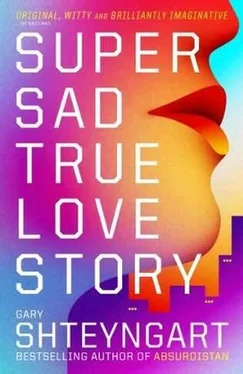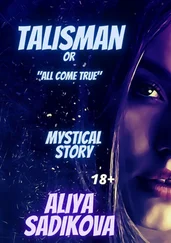“At least let’s make sure we get all your Mason Pearson hairbrushes,” I said, taking a sip, then passing it to her. She brushed her thick mane in acknowledgment. We kissed, two mouths, coffee breath. Her eyes were closed but I had opened mine; “No cheating!” she used to cry out when I would do that. I pressed my nose into the galaxy of freckles, some orange, some brown, some planet-sized, others the fine floating detritus of space. “How am I going to let you go?” I said.
She pulled away. “What do you mean?” she said.
“Nothing.” What did I mean? There was heat in my temples, but my feet were ice. The elevators were full of old people and their stuff, but we managed to get our boxes downstairs to the lobby, Eunice making sure to help the older people with their sacks of medicine, their tangles of hosiery, and all those gilt-edged family photos of big and little Jews together. We kicked my boxed library out to the building’s front lawn and toward the Hyundai Town Car.
The first of November. Or thereabouts. We were moved into two rooms on the Upper East Side, a boxy 1950s nurses’ residence on York Avenue that resembled a jigsaw puzzle left out in the rain. Other displaced Staatling-Wapachung youngsters shared the hallways, but once they peeked in and saw that every square inch of our two rooms was stuffed with books, they went into high avoidance mode, even skirting Eunice, their coeval in every way.
On the day Media showed the Grand Street co-op buildings, my sunburned brick beauties, coming down in a cloud of red bricks and gray ash, I started crying, and instead of comforting me Eunice became angry. She said when I got that emotional it reminded her of her dad whenever something bad happened to him, his loss of control, although her father would get violent instead of sad. I looked at her through swollen eyes and said, “Don’t you see the distinction between the two things? Violent and sad.”
She flared the dead smile at me. “I feel like I don’t know you sometimes,” she whispered in a way that was hardly a whisper.
“Eunice,” I said. “My apartment. My home. My investment. I’ll be forty in two weeks and I have nothing.”
I wanted her to say, “You have me,” but it was not forthcoming. I clenched into myself and waited for an hour, knowing her hatred of me would eventually change to a shade of pity. It did. “Come on, tuna-brain,” she said. “Let’s go to the park. I have an hour before work.”
We walked into the warm, pleasant day hand in hand. I watched her. I reveled in the mallard way she threw her feet forward, the pedestrian awkwardness of the born southern Californian. I saw myself in the twin spheres of her sunglasses. I grasped the reflected smile on my own face. How many people are there on this earth who have never known what I had known in the past half a year? Not just a beautiful woman’s love but her inhabitance .
Central Park was filled with people of at least two castes, tourists and occupiers, enjoying the day. The trees held fast, but the cityscape was in constant flux. The skyscrapers framing the lower half of the park looked tired of their history, stripped of commerce, the executive upper floors staring down into empty lobbies and concrete plazas where lamb kebabs and hummus spreads once fueled the world’s most storied white-collar workforce. Soon they would be replaced with curt, smart residential units with Arab, Asian, and Norse designations.
“Do you remember,” I said to Eunice, “the day you came back from Rome? It was June 17. Your plane landed at one-twenty. And the first thing we did was take a walk in the park. I think that was around six. It was getting dark, and we saw the first LNWI camp. The bus driver who later got killed. Aziz’s Army. Whatever happened to that? Jesus. Everything changes so fast. Anyway, we took the subway uptown. I paid for business class. I was so trying to impress you. Do you remember?”
“I remember, Lenny,” she said, briskly. “How could you think I would ever forget that, tuna?” We bought an ice cream from a man dressed like a nineteenth-century carnival barker, but it melted in our hands before we even opened it. Not wanting to waste the five yuan, we drank it straight from the paper wrap, then wiped the patches of chocolate and vanilla from each other’s faces.
“Remember,” I tried again, “the first place we went to when we came to the park?” I took her by the hand and led her past the throng-choked Bethesda Fountain, the Angel of the Waters statue, lily in hand, blessing the tiny lakes below. Once the familiar Cedar Hill was in our sights, she turned around so quickly my arm cracked within its socket. “What’s the matter?” I said. But she was already taking me away from my nostalgia, walking toward safer emotional climes.
“What is it, honey?” I tried again.
“Don’t, Lenny,” she said. “You don’t have to keep trying.”
“We can get out of here!” I almost shouted. “We can go to Vancouver. We can get Stability-Canada residency.”
“Why, so you can be with your Grace ?”
“No! Because this place…” I gestured a full two hundred degrees with one spastic arm, trying to encompass the totality of what had become of my city. “We won’t survive together in this place, Eunice. No one can anymore. Only people with blood on their hands.”
“So dramatic,” Eunice said. The way she said it, her tone not just compassionless but assured, made me fear the worst. She was in possession of something I didn’t know about, or maybe knew too well.
We went in a southerly direction via a cemented road, avoiding the Sheep Meadow, where we had taken our first long kiss in New York, and all the other snug, green, tender-hearted places where we had found love. At Central Park South, before the row of reconfigured Triplexes that used to be the mansard-roofed Plaza Hotel, surrounded by the piles of horse shit that demarcated the grass and trees from the difficult city, we both looked back at the park.
“I have to go,” she said.
“Let me take you to work.” I stood there, not wanting to lose a minute with her, feeling the end drawing near. “Look, the cabs are back! Hallelujah! Let’s get one. My treat.”
I let her go at Elizabeth Street, at the Retail place where, courtesy of Joshie’s connections, Eunice now sold recyclable leather wristbands featuring avant-garde representations of decapitated Buddhas and the words RUPTURE NYC for two thousand yuan apiece. I hid behind the trunk of an exhausted urban tree and watched. She worked alongside another girl, a dark-haired and voluptuous member of Boston’s Irish diaspora, and the store’s manager, a much older woman who intermittently showed up to stick her finger in the chests of her underlings and to growl at them in Argentine-accented English. I watched Eunice work-diligently sweeping the store with a lovely Thai straw broom, anticipating the questions of the adventurous Chinese and French tourists who stopped by, and parrying them with a toothy smile, tallying up the sales on an old äppärät at the end of the day, and then, when the last yuan and euro were accounted for, waiting for the store’s shutters to close so that she could stop smiling and put on her usual face, the face of a grave and unmitigated displeasure.
A Town Car pulled up to the curb, aggressively stubbing its nose between two parked cars. A man sprang out from the back seat, powerful legs carrying him into the store. Was it him? The back of the head, shorn, globular, rosy. A cashmere sport coat, a little too formal and expensive. The gait? That uncertain balance that had first made me fall for him? I wasn’t sure. But so what? So what if he had come to see her? He had got her the job after all. He was just checking up on his investment. In the store I saw her speaking to the man, looking up at him. Those eyes. When they took in important information they narrowed and refused to blink. Then there was the tilt of the chin. Worshipful.
Читать дальше












